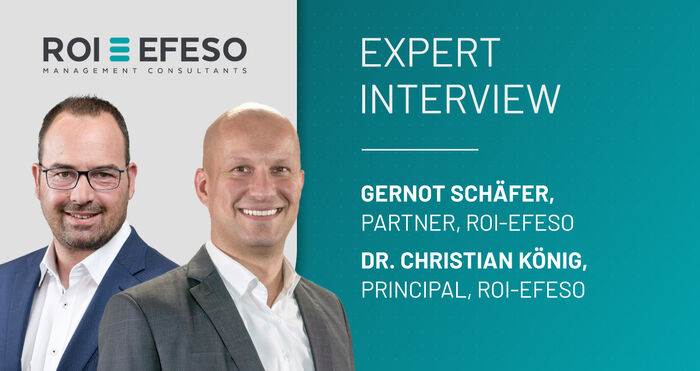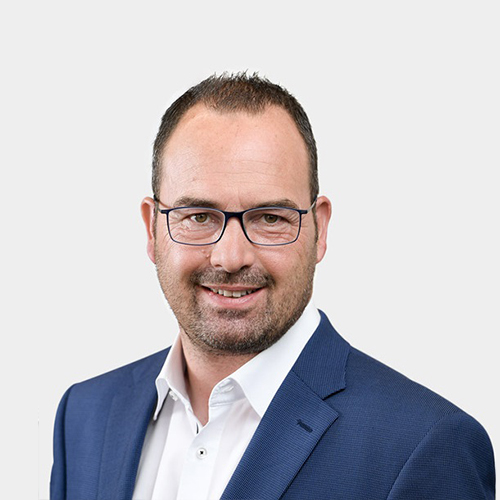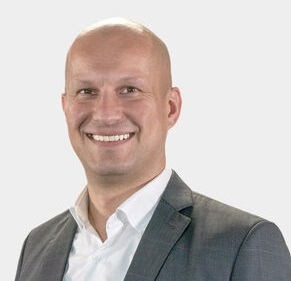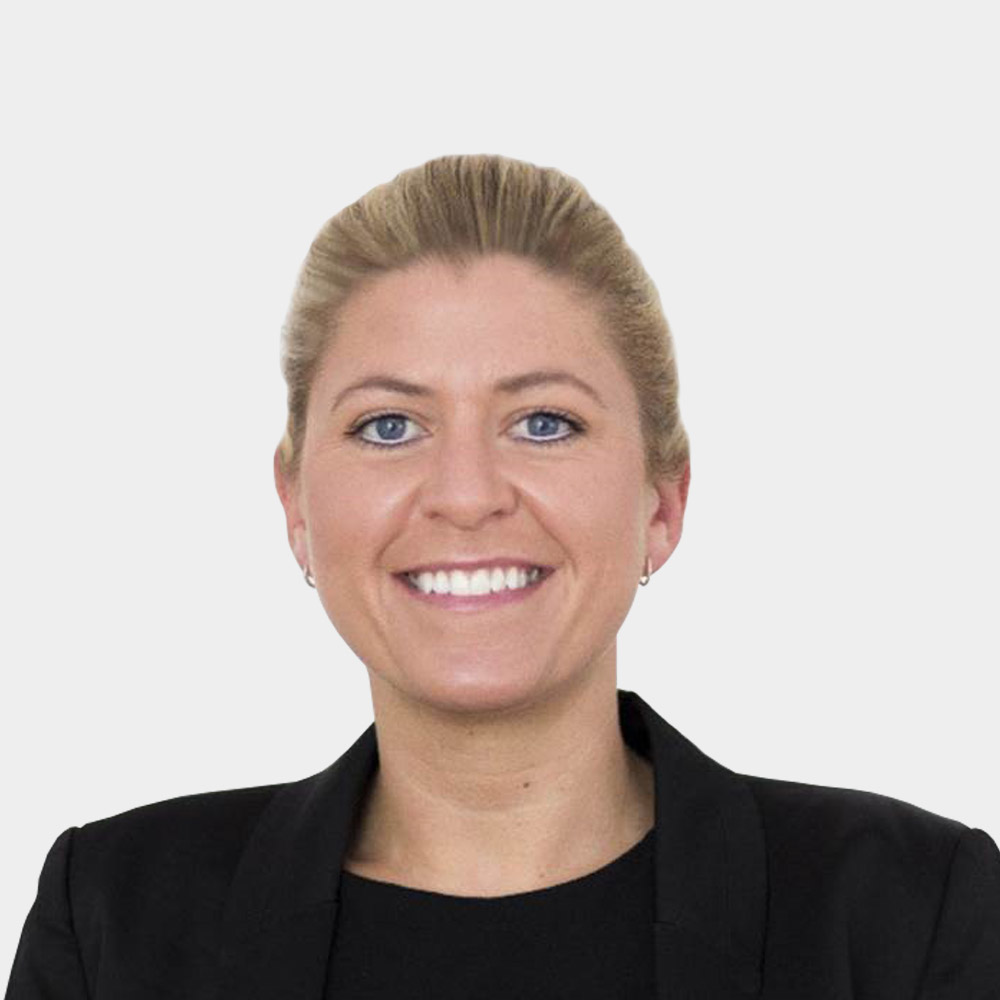TOPICS & NEWS
Articles and interviews on current trends, technology and industry challenges, information on our consulting services, seminars and events as well as company topics:
Here you can find out what drives EFESO.
Interview
Complexity devours innovation
Experte: Gernot Schäfer, Partner, EFESO | 10/31/2024 | Teilen auf in

Measures against overloaded IT/OT infrastructures in industrial companies
Interview with Gernot Schäfer, Partner, and Dr. Christian König, Principal at EFESO
Thanks to AI-based technologies, the creation of software applications requires less and less expert knowledge. How does this development affect industrial digitalization? What new scope for action is opening up for manufacturing companies?
Christian König: In the current phase of digitalization, the change in the roles of technology drivers that has been taking place for a few years is becoming more apparent: In the past, investments by traditional companies and industrial groups determined the framework conditions for IT innovations, with the consumer market as a secondary arena. Since the emergence of the new economy, however, this relationship has completely reversed – today, consumers are setting the technology trends, and the manufacturing industry is following suit. With developments in AI and software coding, this is gaining further momentum, with progress now being made in monthly rather than annual cycles.
For the manufacturing industry, this further increases the pressure to focus on the customer with digital business models if this has not yet happened or has only happened to a limited extent. This can be observed in pharmaceutical companies, for example, which are evolving from traditional cluster manufacturers into integrated healthcare providers. In addition to selling their products, they can also get in touch with customers via an app, record medically relevant data and customize the products. That is already a significant room for maneuver.
Above all, this creates new ways of communicating products and services to customers. This in turn requires the company to design and operate the connected operations processes with a high degree of flexibility, be it in production planning, product tracking or innovation management.
Gernot Schäfer: In my experience, many industrial companies are already very consciously focusing on digitalization in order to achieve and secure this flexibility. However, this is often accompanied by the concern that the increasing complexity of managing digital transformation cannot be mastered with the available financial and human resources.
This situation may characterize the everyday life of many companies, but we should be optimistic here. For the following reason alone, that many small, specialized technology providers have already established themselves, reliably taking over digitalization and automation tasks from the industry and improving key processes instead of complicating them. For example, in the case of platform-based approaches, regarding to "containerization". Manufacturing companies no longer need to introduce a large, monolithic MES platform. Their performance can be distributed across the shoulders of individual technology providers, each of which brings particular strengths to the table. At the same time, this approach helps to achieve a flexible, improved ability to respond to customers and market changes.
However, different individual solutions then have to be orchestrated, which again creates complexity ...
GS: This cannot be directly compared with each other – there is a big difference between managing a large platform solution and a modular architecture made up of individual solutions. In the second case, you are not dependent on one or a few IT service providers. You can quickly stop what doesn't work – and scale up what works well. For example, replacing an APS solution with AI.
Of course, the total number of solutions used can create complexity that needs to be managed. However, companies are confronted with this anyway as soon as they further develop their partner and supplier network in the sense of an eco-system. The boundaries between technology / IT architecture, portfolio and project management are blurred in this case. Furthermore, there is no "final" ideal state for technological infrastructures. Their management is a dynamic, progressive process in which the focal points where complexity arises also shift.
CK: The success of transformations will always depend on the ability to master complexity. This includes prioritizing the challenges, for example when dealing with topics such as "data quality" and "data security". Even in very advanced digitalized companies, we see that not everything is running optimally in these important areas. However, this is the basis for the effective use of integrated or automated AI systems: AI algorithms require solid data structures and secure data availability in order to develop their full potential.
Discuss with us how you can set up efficient and effective IT / OT infrastructures in your company.
Learn more about managing complexity:

Where should companies start to create this basis and make the best use of their data?
CK: In general, they should recognize the critical importance of the topic of "data management" for their digital transformation. Suitable starting points arise when strategic and operational questions are discussed and answered, such as: Which products, goals and players can be used to build a lucrative, data-driven business model? How does value creation through data actually come about? And how can competitive advantages be achieved in the future?
An expanded understanding of "data quality" is important here. This means questioning the specific added value that results from investments in data collection and utilization technologies. These can be monetary KPIs or the benefits that arise in terms of customer orientation. It is also essential to quantify the so-called "cost of doing nothing": How much does it hurt the company in euros, if these issues are neglected? At what point can this have a detrimental effect on business? This helps to identify investment targets and expectations and to bring them into a realistic relationship with one another.
GS: I also see a need for action in the area of employee empowerment. Giving every employee access to the data relevant to them is only the first infrastructural step. Then we need to continue with training and communication to raise awareness of the importance and potential of data.
Companies should therefore specifically build up "data competence" in their workforce. Currently, these skills are mainly found among data scientists, data engineers and data analysts. These data competences will become increasingly important in the future, in all areas of operations. Turning bits and bytes into information and knowledge will no longer be enough in the future. In addition, employees must be able to understand the strategic relevance of data and translate this into results.
"Turning bits and bytes into information and knowledge will no longer be enough in the future. In addition, employees must be able to understand the strategic relevance of data and translate this into results.“

What approach do you recommend to achieve this in the digital transformation?
CK: A target image, a framework for action, is important as a starting point. To outline this, e.g. by a subdivision into a technical and an organizational dimension makes sense. Possible focal points on the technical side include, for example, a holistic data model of the factory or a Unified Namespace (UNS, an IIoT concept). The focus is on ensuring technical, contextual and semantic consistency throughout the entire data model, i.e. resolving inconsistencies and imprecision.
The organizational dimension complements this with regard to data governance and data management. This is not done with master data maintenance as in the past. Today, a solution architect has to help design, build and further develop the entire factory data model. Furthermore, he has to be able to think beyond this and to integrate new topics. For example, in case of a detailed scheduling with AI or by creating the optimal connection of customers and suppliers to the factory's system world: How do such aspects affect the data model? How can the IT / OT technologies used be successfully orchestrated? Without such an organizational framework, even the best ideas usually don't work.
GS: Of course, the answer to this question also depends on the initial situation in the company. Anyone who is already building a progressive, data-driven corporate culture will obviously look at the topic differently than someone who has only recently started working on the digital transformation of a side or production area. Another common scenario for us: getting high-risk IT projects back on track for success, that are on the brink of collapse, e.g., in the ERP or SAP context. There are overlaps in the approach here, for example in focusing on the areas of innovation, profitability, and transformation.

Let's briefly consider the possible effects of AI. For instance, how do you use AI with your customers to master complexity?
GS: We examine the classic stages of IT / OT management, i.e. strategy, process, requirements, solution options, architecture – and then determine where the use of AI is worthwhile in the sense that it fits in with the strategic orientation already explained. Complexity can then be reduced at various points: e.g., by operating production planning at a different level with AI than with APS. Or by improving quality assurance with "pattern matching". The only difference is that completely different AI concepts, approaches and engines are used.
CK: Here, too, we should bear in mind the aforementioned "triad" of innovation, profitability, and transformation. This proves to be a success factor. Not only in our process models, but also in the selection, evaluation, and use of technologies such as AI.
Learn more about solutions for industrial digitalization
Interview partner

Gernot Schäfer, Partner, ROI-EFESO
Gernot Schäfer supports EFESO's clients in their strategic alignment in the fields of "Operational Excellence" and "Digitalization". Bringing new information technologies into manu-facturing environments and inspiring people with leading-edge innovations is his passion.

Dr. Christian König, Principal, EFESO
Christian König supports companies in their digital transformation. Together with his clients, he focuses on process and IT harmonization.
|
|
Thank you for Signing Up |



